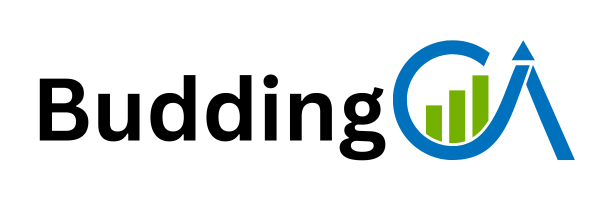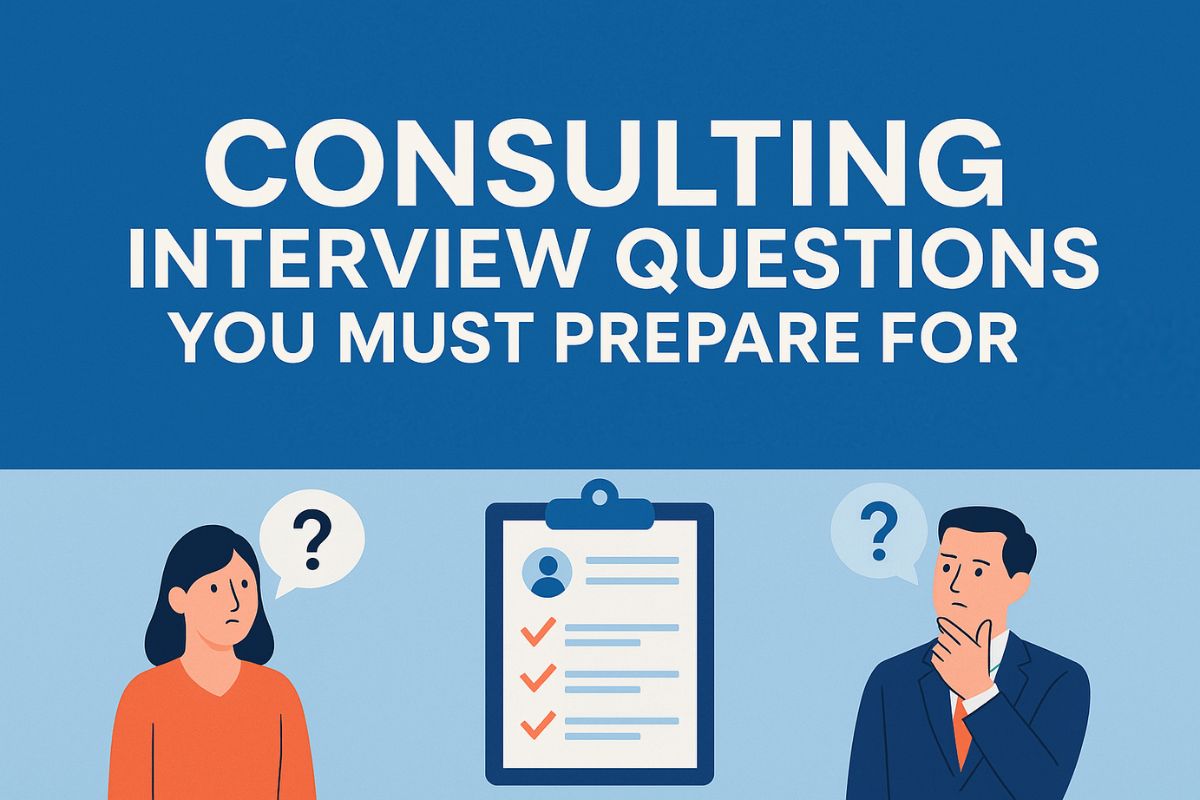Breaking into the consulting domain is a goal for many ambitious professionals. However, cracking a consulting interview can be a tough challenge. Consulting firms are known for their rigorous hiring processes that test your problem-solving ability, business sense, communication skills, and cultural fit.
If you are preparing for consulting interviews, it is important to know the common questions asked and how to answer them effectively. This article provides a comprehensive overview of typical consulting interview questions, the thinking behind them, and strategies to give strong answers. Whether you are a fresh graduate or a working professional aiming to enter the consulting field, this guide will help you prepare with confidence.
What Does a Consulting Interview Test?
Consulting interviews generally assess three core areas:
- Case Interviews: Your ability to solve business problems through structured thinking.
- Behavioural Questions: Your leadership, teamwork, and communication skills.
- Fit and Motivation: Why you want to work in consulting and why the particular firm interests you.
Understanding these aspects will help you prepare better responses.
1. Why Consulting? Why This Firm?
Almost every consulting interview begins with this question. The interviewer wants to see if you have a clear purpose and genuine interest in consulting.
How to prepare:
- Reflect on your career goals and how consulting fits into your plans.
- Research the firm’s work culture, sectors of focus, and notable projects.
- Provide a unique reason for choosing that firm. Avoid generic answers.
Sample answer:
“I am passionate about solving complex problems and making a measurable impact. Consulting excites me because it offers exposure to diverse industries and strategic challenges. I am particularly drawn to [Firm Name] because of its strong presence in digital transformation projects, which aligns with my experience working on technology adoption in the financial sector.”
2. Walk Me Through Your Resume
This question tests your communication skills and your ability to present a coherent narrative.
Tips:
- Keep it concise but complete.
- Emphasise achievements with measurable impact.
- Link your experiences to consulting skills like analysis, leadership, and teamwork.
3. Tell Me About a Time You Led a Team
Leadership is essential in consulting.
Answer format: Use the STAR method – Situation, Task, Action, Result.
Focus on what you did, how you motivated others, and the outcome.
4. Describe a Complex Problem You Solved
Consulting firms want candidates who can think critically.
How to answer:
- Explain the problem clearly.
- Break it down logically.
- Describe your approach and the results.
5. Case Interview Questions
Case interviews simulate real consulting problems. They assess your problem-solving, analytical skills and communication.
Common Types of Case Questions:
a) Market Sizing:
Estimate the size of a market using logical assumptions and calculations.
Example: “Estimate the annual demand for bottled water in Mumbai.”
b) Profitability Cases:
Identify why a company’s profits are falling and suggest solutions.
Example: “A textile company’s profits have declined over the past year. Diagnose the problem.”
c) Market Entry:
Evaluate if a company should enter a new market.
Example: “Should an Indian FMCG firm enter the organic skincare market?”
How to Approach Case Questions:
- Listen carefully and ask clarifying questions.
- Structure the problem logically (for example, use frameworks like Profit = Revenue – Cost).
- Work through each part step-by-step.
- Use basic math confidently.
- Think aloud so the interviewer can follow your thought process.
- Summarise findings and give a recommendation.
6. Common Frameworks to Use
While frameworks should not be rigidly applied, they help structure your thinking.
- Profitability Framework: Revenue and Costs
- 4 Ps of Marketing: Product, Price, Place, Promotion
- Porter’s Five Forces: Industry competition analysis
- SWOT Analysis: Strengths, Weaknesses, Opportunities, Threats
- Customer Segmentation: Dividing the market based on customer traits
7. Behavioural Interview Questions
Consulting firms want to see how you handle situations beyond numbers.
Examples:
- Describe a time you faced a conflict in a team.
- Tell me about a failure and what you learnt.
- How do you handle pressure and deadlines?
- Give an example of when you took initiative.
Use the STAR technique for structured answers and focus on what you learnt or how you improved.
8. Questions Testing Your Business and Industry Knowledge
Consultants need to stay updated on market trends and industry dynamics.
Examples:
- What are the challenges faced by the Indian banking sector today?
- How is digitalisation impacting healthcare?
- Explain how GST has affected small businesses.
Stay informed by reading industry reports, business newspapers like The Economic Times, and firm publications like McKinsey Insights.
9. Technical Questions
While not the primary focus, you may be asked basic finance or economics questions.
Common ones include:
- Difference between EBITDA and net profit.
- Explain what working capital is.
- Basics of discounted cash flow (DCF) valuation.
Being comfortable with such concepts strengthens your overall credibility.
10. How to Prepare for Consulting Interviews
- Practice case interviews with friends, mentors, or online platforms.
- Read popular case prep books like Case in Point by Marc Cosentino.
- Take virtual training programmes offered by firms like BCG or Bain.
- Participate in case competitions or consulting clubs.
- Build a story for your CV highlighting leadership and problem-solving.
- Keep up with current affairs and industry news.
- Record mock interviews to self-evaluate and improve.
11. Tips for Virtual and Group Interviews
Virtual interviews have become common.
- Ensure a quiet, well-lit space with a reliable internet connection.
- Keep your webcam at eye level and dress professionally.
- Practice using virtual whiteboards or collaboration tools.
- For group cases, balance contributing ideas with encouraging others to speak.
12. Mistakes to Avoid
- Jumping to conclusions without clarifying questions.
- Using frameworks mechanically without adapting to the problem.
- Ignoring data or refusing to do calculations.
- Speaking too fast or unclearly.
- Giving generic answers to “Why consulting?”
13. Sample Consulting Interview Questions for Practice
- How would you estimate the size of the Indian e-commerce market?
- A client’s sales have dropped 15% year-on-year. What would you investigate?
- Should a telecom company offer unlimited data plans?
- Explain the impact of rising fuel prices on airline profitability.
- Tell me about a time you influenced someone with a different opinion.
Final Words
Cracking consulting interviews requires a combination of sharp analytical skills, clear communication, and genuine enthusiasm for the consulting world. Prepare well by practising case studies, refining behavioural stories, and building knowledge of industries and business fundamentals.
Remember, the goal is not just to find the “right” answer but to demonstrate your thinking process clearly and confidently. With dedicated preparation and the right mindset, you can position yourself strongly to succeed in this competitive field.
Calling all CA dreamers!
🔴 Are you tired of searching for the perfect articelship or job?
Well, fear no more! With 10K+ students and professionals already on board, you don't want to be left behind. Be a part of the biggest community around! Join the most reliable and fastest-growing community out there! ❤️
And guess what? It’s FREE 🤑
✅ Join our WhatsApp Group (Click Here) and Telegram Channel (Click Here) today for instant updates.




